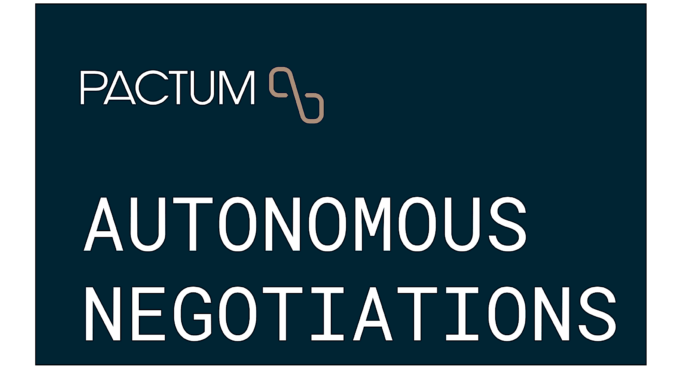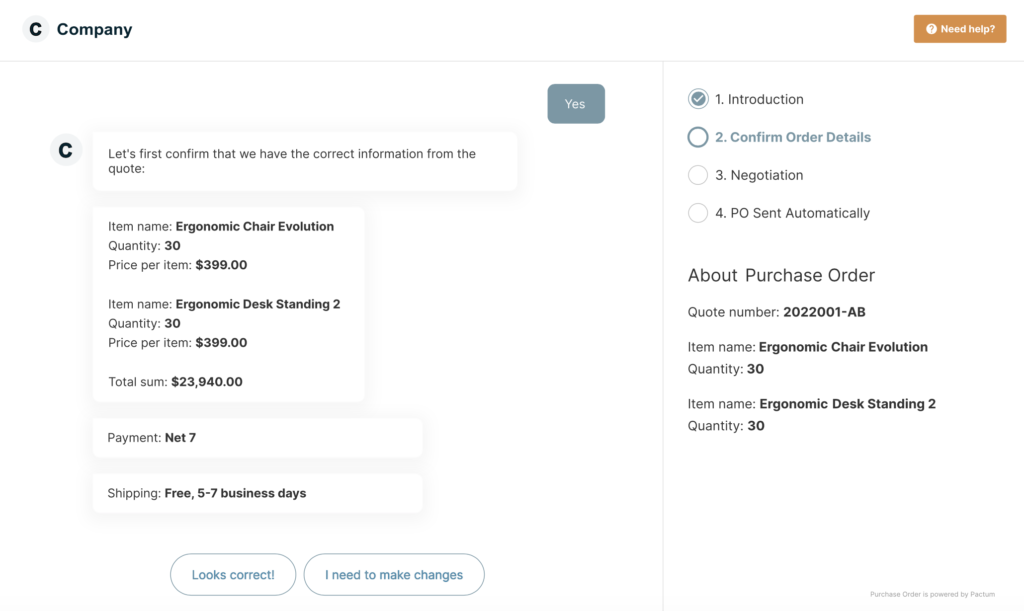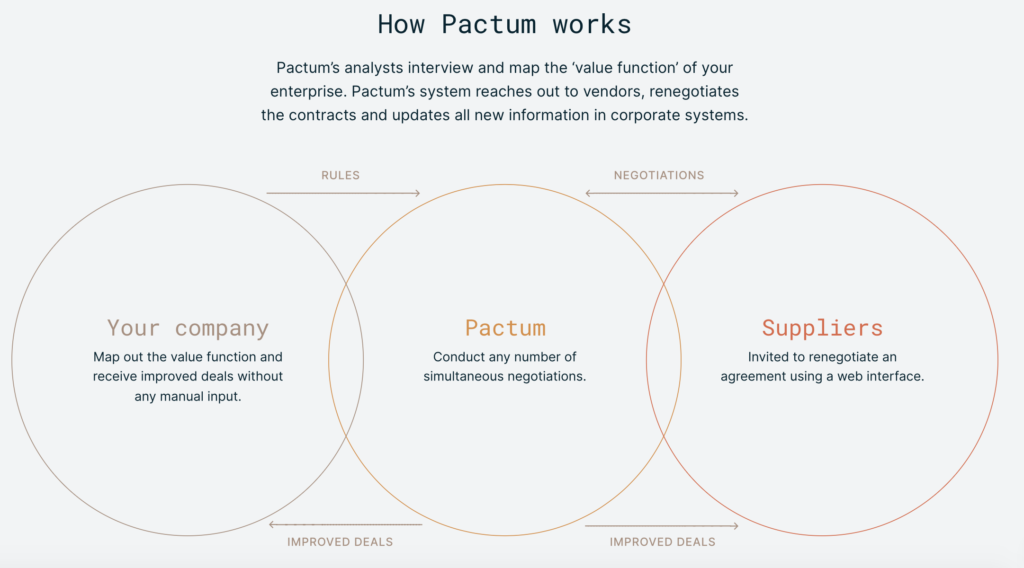
After the ChatGPT frenzy of last weekend some may wonder if automated negotiation for lawyers will soon be here, at least for one side of a deal. The reality is that ‘autonomous contract negotiation’ is already here and one of its main proponents, Pactum, has just raised $20m to further its aims.
This site has covered the company before (see 2020 story here), but it doesn’t often court publicity in the legal tech world. This is what it does: ‘Pactum uses advanced mathematical models, cognitive science, and best-in-class negotiation techniques, to leverage intelligent bots to digitally engage third parties and negotiate mutually-benefiting contracts, leading to better pricing, payment terms, and supply continuity.’
I.e. contract completion is largely run autonomously for the company deploying Pactum. The other party, for now, is still 100% human. Of course, the dream for some would be to have two AIs working things out, one for each party, each AI doing its best to help ‘its client’.
(In fact, in a paper Artificial Lawyer’s founder wrote in 2015, before this site got going, the idea of two separate AI systems using game theory to reach a rapidly negotiated equilibrium in a contract was explored. But, we are not there yet. Although, how long before someone finds a way to get two contracting systems to point at each other and have each acting in ‘their client’s best interests’…? It seems to be primarily just a technical speed bump, and not a massive one now, given what we have seen with ChatGPT recently. Probably the bigger question is more around do you want to allow a negotiation between two pieces of software to run all by itself? The answer to that is probably: if there are sufficient guardrails in place and the legal aspects are well controlled, and the financial sums / risk involved is small, then yes.)
The company, which works usually with very large enterprises with equally vast procurement needs, such as Walmart, also explained that: ‘Pactum’s solution, which leverages digital bots that learn over time, creates a fast and responsive environment for users to digitally negotiate deals with thousands of suppliers at a time, leading to productivity gains, cost-reductions and stronger terms for all parties. On average, Pactum generates savings of 3%-5% when fully deployed by enterprise clients, creating hundreds of millions of dollars in unrealised savings.’
Plus, it’s worth mentioning that those savings are for companies with revenues over $5 billion annually. So, for now this is really at the high volume end of the scale.
But, this all makes a lot of sense. These are not super complex deals. This is not a government’s lawyers negotiating with a consortium of investment banks for a project financing to build an airport. This is retail company A that has to source cornflakes from a number of suppliers and is operating within very well-known parameters and traversing legal pathways all parties are familiar with. In those circumstances, autonomous negotiation makes sense. Plus, as noted, for now there is still a human on the other side of the deal.
Back to the funding for a moment. The investment was led by 3VC, with participation from new investors NordicNinja VC and Maersk Growth, and existing investors Atomico, Project A, Metaplanet, and Taavet+Sten. Maersk Growth invested after Maersk’s procurement team has already deployed Pactum’s technology to negotiate spot trucking rates. It has now raised over $32m in total since starting.
Eva Arh, a partner at 3VC, said: ‘We believe Pactum has all the elements needed to be a clear game changer in the business negotiations process. Negotiations are ubiquitous and historically lose-win. With Pactum, agreements are made in a novel way: personalised, fast, with mutual value, and on a massive scale, which leads to faster agreements and a more inclusive process for all parties involved.’
All well and good, but how does it work?

Here’s how they describe what it can do:
‘Fully automated – Automate the entire negotiation process from start to finish. From the initial email that begins the negotiation to the contract generation and signing. Pactum takes the hassle out of renegotiating contracts with your suppliers.
Always up to date – Prices and terms can evolve and change rapidly. Our AI uses up to date information in real time on every negotiation. It also means that if you change your company strategy, all new negotiations reflect your new values instantly.
Custom integration – Pactum seamlessly integrates with existing IT infrastructure. The system works on top of your existing software, meaning no messy or disruptive installs. It works with existing processes much like a human negotiator would.

Live dashboards – Review and monitor results and negotiations in real-time using Pactum’s live dashboards. View all negotiations in an aggregated and detailed view. Import new KPIs, metrics and measures to assess the success of subsequent negotiations. Monitor the value created by our AI.
All your data in one place – No more disorderly contract data. With Pactum, all your negotiation data is structured, stored and systematised. The database can be uploaded into a relevant ERP, procurement suite, spend management or contract management systems. It can also be used as the foundation for data-driven projects.’
–
To conclude, it will be fascinating to see how this goes and what else happens in this space with the advances in AI now. The reality is that much like a standardised NDA, there are contract negotiations where you don’t need to re-invent the wheel, and where automated systems could do just as good a job as a person – but, and it needs to be stressed, only for the most basic of contracts. Automating the simplest things in life makes sense. Automating complex and high-risk things that directly impact people very significantly if things go wrong often does not – or at least needs a ton of additional safeguards. As always it’s a question of balance and judgment when to use an automated (or one could say standardised) approach.